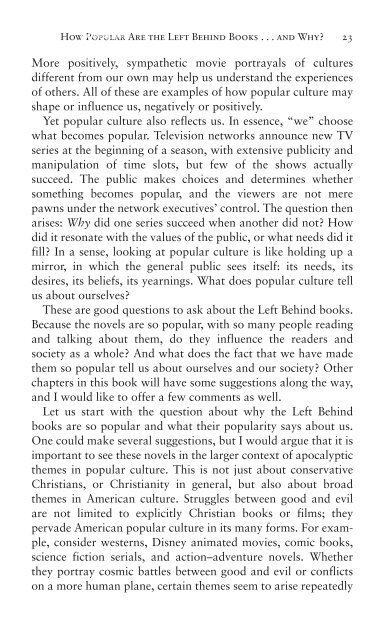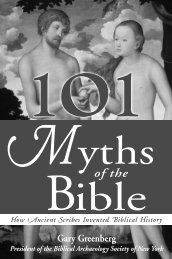Rapture, Revelation, and the End Times - Conscious Evolution TV
Rapture, Revelation, and the End Times - Conscious Evolution TV
Rapture, Revelation, and the End Times - Conscious Evolution TV
You also want an ePaper? Increase the reach of your titles
YUMPU automatically turns print PDFs into web optimized ePapers that Google loves.
How robin-bobin Popular Are <strong>the</strong> Left Behind Books . . . <strong>and</strong> Why? 23More positively, sympa<strong>the</strong>tic movie portrayals of culturesdifferent from our own may help us underst<strong>and</strong> <strong>the</strong> experiencesof o<strong>the</strong>rs. All of <strong>the</strong>se are examples of how popular culture mayshape or influence us, negatively or positively.Yet popular culture also reflects us. In essence, “we” choosewhat becomes popular. Television networks announce new <strong>TV</strong>series at <strong>the</strong> beginning of a season, with extensive publicity <strong>and</strong>manipulation of time slots, but few of <strong>the</strong> shows actuallysucceed. The public makes choices <strong>and</strong> determines whe<strong>the</strong>rsomething becomes popular, <strong>and</strong> <strong>the</strong> viewers are not merepawns under <strong>the</strong> network executives’ control. The question <strong>the</strong>narises: Why did one series succeed when ano<strong>the</strong>r did not? Howdid it resonate with <strong>the</strong> values of <strong>the</strong> public, or what needs did itfill? In a sense, looking at popular culture is like holding up amirror, in which <strong>the</strong> general public sees itself: its needs, itsdesires, its beliefs, its yearnings. What does popular culture tellus about ourselves?These are good questions to ask about <strong>the</strong> Left Behind books.Because <strong>the</strong> novels are so popular, with so many people reading<strong>and</strong> talking about <strong>the</strong>m, do <strong>the</strong>y influence <strong>the</strong> readers <strong>and</strong>society as a whole? And what does <strong>the</strong> fact that we have made<strong>the</strong>m so popular tell us about ourselves <strong>and</strong> our society? O<strong>the</strong>rchapters in this book will have some suggestions along <strong>the</strong> way,<strong>and</strong> I would like to offer a few comments as well.Let us start with <strong>the</strong> question about why <strong>the</strong> Left Behindbooks are so popular <strong>and</strong> what <strong>the</strong>ir popularity says about us.One could make several suggestions, but I would argue that it isimportant to see <strong>the</strong>se novels in <strong>the</strong> larger context of apocalyptic<strong>the</strong>mes in popular culture. This is not just about conservativeChristians, or Christianity in general, but also about broad<strong>the</strong>mes in American culture. Struggles between good <strong>and</strong> evilare not limited to explicitly Christian books or films; <strong>the</strong>ypervade American popular culture in its many forms. For example,consider westerns, Disney animated movies, comic books,science fiction serials, <strong>and</strong> action–adventure novels. Whe<strong>the</strong>r<strong>the</strong>y portray cosmic battles between good <strong>and</strong> evil or conflictson a more human plane, certain <strong>the</strong>mes seem to arise repeatedlyrobin-bobin





